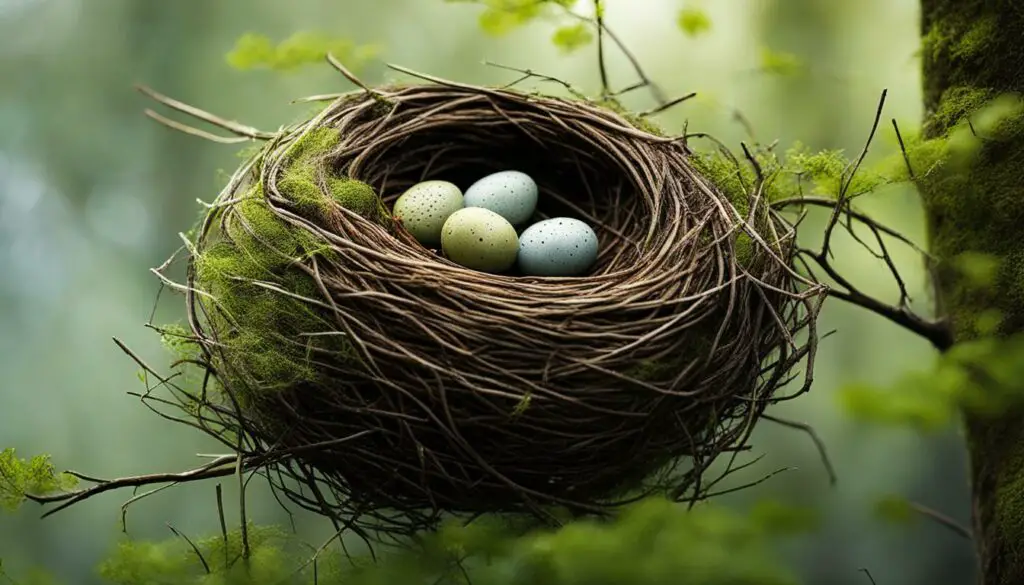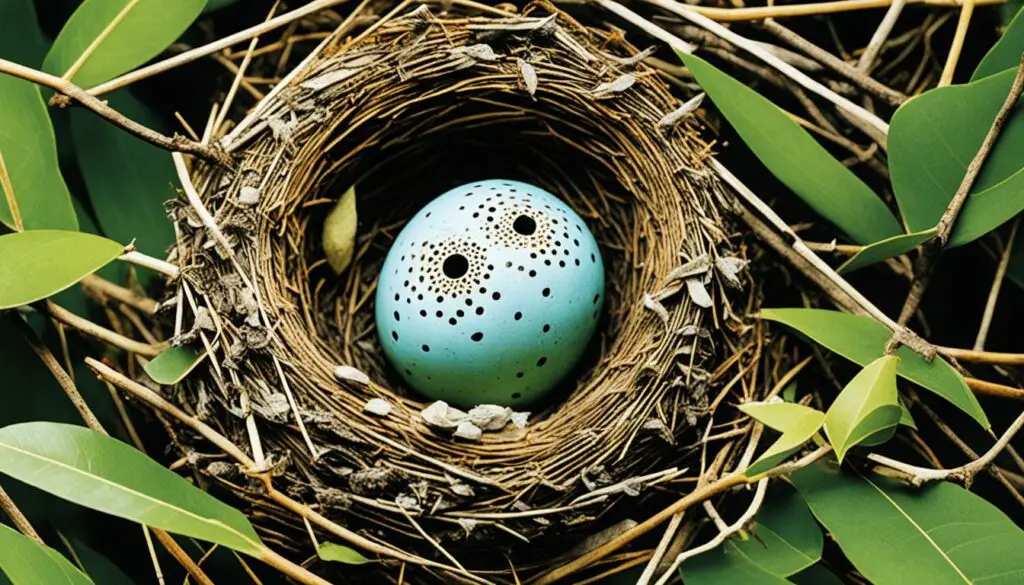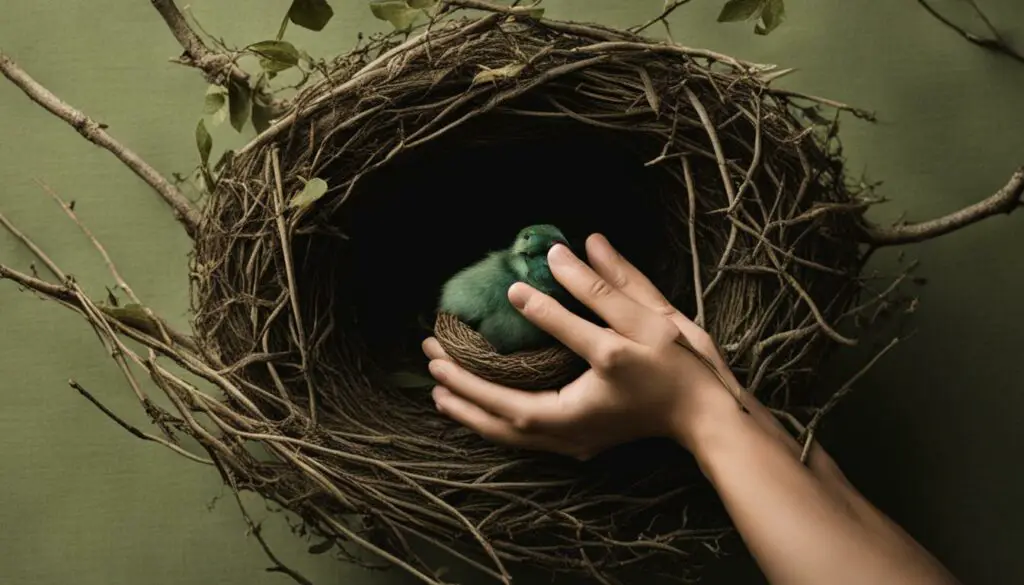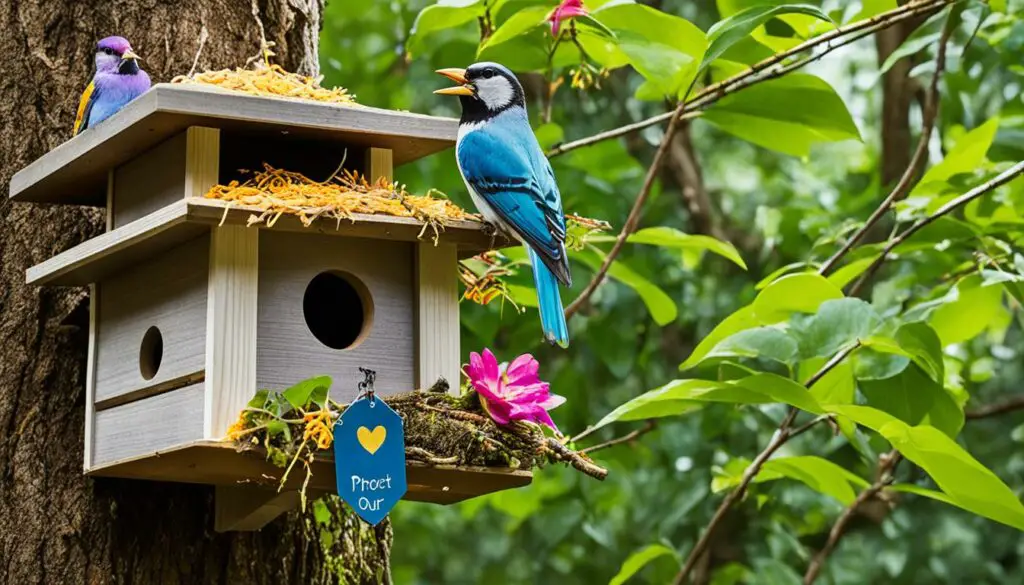The belief that removing a bird’s nest brings bad luck is deeply rooted in superstitions and folklore. Birds have long been associated with supernatural powers and are often seen as harbingers of evil. Various cultural beliefs suggest that disturbing a bird’s nest can lead to curses, headaches, or other forms of misfortune. While there is no scientific evidence supporting these beliefs, many people still adhere to the idea and take precautions to avoid removing or disturbing bird nests.
Key Takeaways:
- The superstition of bad luck associated with removing a bird’s nest is based on cultural beliefs and folklore.
- Birds have long been seen as bringers of evil, leading to the belief that disturbing their nests can result in misfortune.
- While there is no scientific evidence to support this belief, many people still adhere to it out of caution.
- Respecting bird nests is crucial for the well-being of birds and their offspring.
- Education and awareness can help promote a better understanding of the ecological significance of bird nests and dispel unfounded superstitions.
Delving into Symbolism: What Does a Bird’s Nest Represent?

Bird nests are rich in symbolism across cultures. They serve as powerful symbols of new beginnings, representing hope and optimism. The round shape of a nest is often associated with fertility and the cycle of life, reminding us of the continuous renewal and growth in nature. Nests are also seen as a testament to abundance and prosperity, as birds meticulously gather materials from the natural world to construct their homes.
Moreover, bird nests hold a deeper significance of protection and safety. They serve as sanctuaries for birds and their young, providing a nurturing environment for growth and development. Just like a nest provides shelter for its inhabitants, it symbolizes the safeguarding of life’s precious moments and the preservation of cherished memories.
Different cultures have their own interpretations of bird nest symbolism and varied views on interfering with them. In some cultures, bird nests are considered sacred and interfering with them is seen as a disruption of the natural order. On the other hand, some cultures view bird nests as a valuable natural resource and may even have traditions around their use.
Is It Good Luck to Have a Bird’s Nest?

The belief that having a bird’s nest on your property brings good luck is prevalent in many cultures. While there is no scientific evidence supporting this belief, anecdotal accounts suggest a positive correlation between bird nest presence and positive events such as increased wealth, improved health, and overall happiness. However, it’s important to note that correlation does not imply causation, and the belief itself can have a positive psychological impact, fostering an optimistic outlook and positive mindset.
Beliefs about bird nest removal have deep roots in myths and folklore. People from various cultures have held the belief that removing or disturbing bird nests can result in curses, bad luck, or physical discomfort. These superstitions have persisted over time, with some individuals taking precautions to avoid any interactions with bird nests.
Myths About Removing Bird Nests
One myth surrounding bird nest removal claims that it will bring bad luck or curses upon those who disturb the nest. This belief is rooted in superstition and lacks scientific evidence to support its validity.
Another common myth suggests that disturbing a bird’s nest can cause headaches or other forms of physical discomfort. This belief, like the previous one, is not based on scientific evidence and should be approached with critical thinking.
It’s important to understand that these beliefs are part of folklore and cultural traditions rather than scientific fact. While they may hold significance in certain communities, it’s essential to approach them with an open mind and consider the ecological importance of bird nests.
Folklore About Disturbing Bird Nests
In some cultures, folklore surrounding bird nest disturbance emphasizes the belief that it can result in long-lasting misfortune or curses. This folklore serves as a cautionary tale, discouraging individuals from interfering with bird nests and emphasizing the need to coexist harmoniously with nature.
However, it’s crucial to remember that folklore is often based on cultural beliefs and traditions rather than scientific evidence. While respecting cultural perspectives on bird nests is important, it’s equally vital to evaluate these beliefs critically and make informed choices based on ecological considerations and individual circumstances.
Image: A bird’s nest, representing the beliefs and folklore surrounding bird nest removal.
Found a Bird’s Nest? Here’s What to Do:

If you come across a bird’s nest on your property, it is important to respect its presence. Avoid disturbing the nest or the birds, as this can cause them to abandon it and endanger the eggs or fledglings. If the nest is in an inconvenient location, such as near a window or on a power line, it may require careful relocation. However, it’s crucial to exercise extreme caution during the process to avoid disturbing the inhabitants. Once the birds have hatched and flown the nest, it is safe to remove it if desired. Consider leaving the nest materials behind, as other birds may utilize them for their own nests.
Here’s a step-by-step guide:
- Step 1: Assess the situation
- Step 2: Avoid disturbing the nest
- Step 3: Relocate if necessary
- Step 4: Wait for the birds to leave
- Step 5: Consider leaving the nest materials
Take a moment to evaluate the location and condition of the bird’s nest. Determine if it poses any immediate risks or inconveniences.
Respect the bird’s nest and avoid touching or moving it. Any interference can lead to potential harm to the eggs or fledglings.
If the nest is in a hazardous location, such as near a window or on a power line, you may need to carefully relocate it. However, this should only be done by experienced professionals or with guidance from local bird conservation organizations.
Once the birds have hatched and flown the nest, it is safe to remove it if desired. However, it’s important to wait until the nest is completely abandoned to avoid any disturbances.
Leaving the nest materials behind can provide resources for other birds in the vicinity. It contributes to the natural cycle of nest building and supports the local bird population.
By following these steps, you can ensure the well-being of the birds and contribute to a harmonious coexistence between humans and wildlife.
The Significance of Bird Nests in Different Cultures
Bird nest removal holds different cultural significance across various cultures. In some cultures, interfering with bird nests is seen as a taboo or a sign of disrespect, representing an interference with nature and the disruption of the natural order. Other cultures may view bird nests as sacred or auspicious, symbolizing fertility, protection, and abundance. It’s important to respect and understand the cultural beliefs and values surrounding bird nests in different communities.
Common Myths About Bird Nest Removal

When it comes to bird nest removal, there are several common myths and folklore that have been passed down through generations. While these beliefs may vary across cultures, they all share a common thread of superstition and cultural traditions. Let’s take a closer look at some of the most prevalent myths surrounding the removal of bird nests.
Myth 1: Removing a bird’s nest brings bad luck or curses
“If you remove a bird’s nest, you’ll be cursed for several years.”
This myth suggests that disturbing or removing a bird’s nest will bring bad luck or result in curses that can last for an extended period of time. While this belief has no scientific basis, it has persisted due to the strong ties between birds and superstitions in various cultures.
Myth 2: Disturbing a bird’s nest causes physical discomfort
“If you disturb a bird’s nest, you’ll develop headaches or experience physical discomfort.”
Another common myth is that interfering with a bird’s nest can lead to headaches or other forms of physical discomfort. While there is no evidence to support this claim, it has been perpetuated through folklore and cultural traditions.
It’s important to approach these myths with critical thinking and consider them as cultural beliefs rather than scientific facts. Understanding the origins of these superstitions can help us separate fact from fiction and make informed decisions regarding bird nest removal.
Summary:
- Myth 1 suggests that removing a bird’s nest brings bad luck or curses, which is not supported by scientific evidence.
- Myth 2 claims that disturbing a bird’s nest can cause physical discomfort, although there is no basis for this belief.
By dispelling these myths and understanding the cultural significance behind bird nest removal, we can approach this topic with a more informed perspective.
Cultural Perspectives on Interfering with Bird Nests

Different cultures have their own perspectives on interfering with bird nests. In some cultures, there are traditional views that consider disturbing a bird’s nest as disrespectful and believe it can bring bad luck or curses. These cultural beliefs are deeply rooted and have been passed down through generations.
On the other hand, in certain cultures, bird nest removal is seen as a necessary action for property maintenance or safety reasons. They prioritize human needs and consider bird nests as potential hazards.
It’s important to understand and respect the cultural context and values associated with bird nest removal in different communities. These beliefs and practices reflect the unique traditions and customs of each culture.
“In our culture, interfering with bird nests is considered taboo. It is believed that disturbing a bird’s nest disrupts the natural order and can bring misfortune upon oneself.” – Traditional beliefs from Culture A
“Removing bird nests is a common practice in our community due to safety concerns. We prioritize the well-being of our residents and the prevention of damage to structures.” – Safety-driven perspective from Culture B
By recognizing and appreciating the cultural significance of bird nest removal, we can foster understanding and dialogue among different communities. This can lead to more informed and respectful decision-making regarding bird nests and contribute to the conservation efforts of these avian habitats.
Bird Nest Removal Practices in Different Cultures
| Culture | Traditional Beliefs | Perspective on Removal |
|---|---|---|
| Culture A | Disturbing bird nests is taboo and can bring bad luck | Strongly discourage removal due to cultural significance |
| Culture B | No particular beliefs on bird nest removal | May remove nests for safety reasons |
| Culture C | Nests are seen as sacred and protection for birds | Avoid removal to maintain harmony with nature |
As demonstrated by the table above, cultural perspectives on bird nest removal vary significantly. These practices are shaped by deep-seated beliefs and are influenced by factors such as spirituality, traditions, and safety concerns. Understanding and respecting these diverse perspectives can foster a sense of inclusivity and promote a harmonious coexistence between humans and birds.
The Psychological Impact of Bird Nest Beliefs

The belief in the potential consequences of removing a bird’s nest can have a psychological impact on individuals. These beliefs are often rooted in superstitions, myths, and folklore that have been passed down through generations. By believing in these beliefs, people develop a sense of caution and respect for nature, understanding that interfering with a bird’s nest could lead to negative outcomes.
At the same time, these beliefs can also create a sense of optimism and positive outlook. Some individuals attribute positive events or good luck to the presence of a bird’s nest, seeing it as a symbol of blessings and protection. This belief in the positive forces associated with bird nests can bring comfort and a sense of connection to the natural world.
“The presence of a bird’s nest in my garden always brings me joy and a sense of harmony. I believe it’s a sign of good luck and prosperity for my family.” – Jane, a bird enthusiast.
It’s important, however, to maintain a balanced perspective and approach these beliefs with critical thinking. While bird nest beliefs may hold cultural and personal significance, it’s essential to remember that they are not based on scientific evidence. Instead, they are based on traditions, stories, and cultural interpretations that vary across different communities.
Conservation and Bird Nest Protection

Bird nest protection and conservation are paramount when it comes to dealing with bird nests. While there may be situations where the removal of a bird’s nest is necessary, it is crucial to prioritize the well-being and safety of the birds. By understanding the ecological importance of bird nests and recognizing their role in the natural world, we can foster responsible actions and promote conservation efforts.
The traditional views on interfering with bird nests vary across cultures, highlighting the significance of bird nest removal in different communities. Some cultures perceive disturbing a bird’s nest as disrespectful and believe it can bring bad luck or curses. Conversely, other cultures may view bird nest removal as a necessary action for property maintenance or safety reasons.
“Birds are an integral part of our ecosystem, and their nests are essential for their survival and the balance of nature. By protecting and preserving bird nests, we contribute to the conservation of bird populations and the overall health of our environment.”
Understanding the cultural beliefs and perspectives surrounding bird nests can help foster respect and sensitivity when considering bird nest removal.
By raising awareness about the ecological significance of bird nests and the cultural values attributed to them, we can encourage responsible behavior and minimize unnecessary interference. Conservation efforts, such as creating bird-friendly habitats and implementing bird nest protection measures, play a crucial role in ensuring the sustainable coexistence of birds and humans.
Together, let’s prioritize the preservation of bird nests as we strive for a harmonious relationship with our feathered friends.
Benefits of Bird Nest Protection
| Benefits | Description |
|---|---|
| Preservation of Bird Species | Protecting bird nests contributes to the conservation of bird populations, ensuring their survival and biodiversity. |
| Ecosystem Balance | Bird nests play a vital role in maintaining the balance of ecosystems by providing safe spaces for breeding and raising young birds. |
| Fragile Species Protection | Protecting bird nests helps safeguard the reproductive success of fragile bird species that may face habitat loss or other threats. |
| Biodiversity Preservation | Bird nests support the diversity of other species that coexist with birds, creating a healthy and thriving ecosystem. |
| Education and Awareness | By promoting the importance of bird nest protection, we educate individuals about the ecological significance and foster a sense of responsibility towards wildlife conservation. |
The Role of Education and Awareness
Educating individuals and raising awareness about bird nests can foster a deeper understanding and respect for these natural structures. By providing information about the ecological significance of bird nests and addressing cultural beliefs and traditions, we can empower people to make informed decisions and take appropriate actions when it comes to bird nest removal.
Creating awareness about the importance of bird conservation and the role of bird nests in the ecosystem is key to promoting a harmonious coexistence between humans and birds. By understanding the cultural beliefs around bird nest removal and the traditional views on interfering with bird nests, we can work towards finding a balance that respects both nature and cultural values.
The Ecological Significance of Bird Nests
Bird nests are not just simple structures; they serve a vital ecological purpose. They provide a safe haven for birds to lay their eggs and raise their young. Nests offer protection from predators, harsh weather conditions, and other potential threats.
Bird nests also contribute to the overall health of ecosystems. They play a role in seed dispersal, as birds may inadvertently transport seeds in their beaks or feathers while building nests or foraging for food. Nests also serve as habitats for other small animals, such as insects and spiders, creating a thriving microcosm of biodiversity.
Addressing Cultural Beliefs
Cultural beliefs surrounding bird nest removal vary across different communities. Some cultural traditions view interfering with bird nests as taboo or disrespectful, representing an interference with nature and the disruption of the natural order.
By acknowledging and understanding these cultural beliefs, we can foster open dialogues and promote mutual respect. This allows for a better appreciation of the diverse perspectives and values that exist regarding bird nest removal.
Empowering Individuals Through Education
Education plays a crucial role in dispelling misconceptions and cultivating a sense of responsibility towards bird nests. By providing accurate information about the ecological importance of bird nests and debunking myths and superstitions, we can equip individuals with the knowledge they need to make informed decisions.
Through educational initiatives, we can highlight the benefits of bird nest conservation and showcase the positive impact that responsible bird nest removal can have on both human communities and bird populations.
Cultural Beliefs and Traditional Views on Bird Nest Removal
| Culture | Beliefs | Traditional Views |
|---|---|---|
| Chinese | Removing bird nests brings bad luck. | Interfering with bird nests is seen as disrespectful and can lead to curses. |
| Native American | Bird nests are sacred and shouldn’t be disturbed. | Interfering with bird nests disrupts the natural order and can have negative consequences. |
| African | Having a bird’s nest on your property is a sign of protection and good luck. | Interfering with bird nests is believed to anger ancestral spirits. |
Understanding the cultural beliefs and traditional views around bird nest removal is essential for promoting cultural sensitivity and conservation efforts.
Conclusion
The belief that removing a bird’s nest brings bad luck is deeply rooted in superstitions and cultural beliefs. Although there is no scientific evidence supporting these beliefs, they persist in various communities. When it comes to bird nest removal, it is crucial to approach the task with respect, taking into consideration the ecological significance of bird nests and cultural perspectives.
By promoting education and awareness, individuals can make informed decisions regarding bird nest removal. Understanding the consequences of removing a bird’s nest can help foster a sense of responsibility towards the conservation of these vital habitats. Additionally, by respecting cultural beliefs around bird nest removal, we can preserve and honor the diverse traditions that have developed around this topic.
Ultimately, striking a balance between ecological conservation and cultural beliefs is essential. By encouraging the protection and preservation of bird nests, we can maintain a harmonious coexistence between humans and the natural world while respecting the cultural significance associated with these structures.
FAQ
Is removing a bird’s nest bad luck?
The belief that removing a bird’s nest brings bad luck is deeply rooted in superstitions and folklore. While there is no scientific evidence supporting these beliefs, many people still adhere to the idea and take precautions to avoid removing or disturbing bird nests.
What does a bird’s nest represent?
Bird nests are rich in symbolism across cultures. They are often seen as a beacon of new beginnings, symbolizing hope and optimism. Nests are also associated with fertility, the cycle of life, abundance, prosperity, and protection. Different cultures have their own interpretations of bird nest symbolism and views on interfering with them.
Is it good luck to have a bird’s nest?
The belief that having a bird’s nest on your property brings good luck is prevalent in many cultures. While there is no scientific evidence supporting this belief, anecdotal accounts suggest a positive correlation between bird nest presence and positive events such as increased wealth, improved health, and overall happiness. However, it’s important to note that correlation does not imply causation.
What should I do if I find a bird’s nest?
If you come across a bird’s nest on your property, it is important to respect its presence. Avoid disturbing the nest or the birds, as this can cause them to abandon it and endanger the eggs or fledglings. If the nest is in an inconvenient location, it may require careful relocation. However, exercise extreme caution to avoid disturbing the inhabitants. Once the birds have flown the nest, it is safe to remove it if desired.
What is the significance of bird nests in different cultures?
Bird nest removal holds different cultural significance. Some cultures see interfering with bird nests as a taboo or a sign of disrespect, representing an interference with nature and the disruption of the natural order. Others view bird nests as sacred or auspicious, symbolizing fertility, protection, and abundance. It’s important to respect and understand the cultural beliefs and values surrounding bird nests in different communities.
What are some common myths about bird nest removal?
There are several common myths and folklore surrounding bird nest removal. One myth suggests that removing a bird’s nest will result in bad luck or curses, often lasting for several years. Another myth claims that disturbing a bird’s nest can cause headaches or other forms of physical discomfort. These beliefs are deeply rooted in superstition and cultural traditions.
What are the cultural perspectives on interfering with bird nests?
Different cultures have their own perspectives on interfering with bird nests. Some cultures believe that disturbing a bird’s nest is disrespectful and can bring bad luck or curses. In contrast, other cultures may view bird nest removal as a necessary action for property maintenance or safety reasons. It’s important to consider the cultural context and values when evaluating the significance of bird nest removal in different communities.
What is the psychological impact of bird nest beliefs?
The belief in the potential consequences of removing a bird’s nest can have a psychological impact on individuals. Believing in superstitions and folklore can create a sense of caution and respect for nature. It can also instill a sense of optimism and positive outlook. However, it’s important to maintain a balanced perspective and approach these beliefs with critical thinking.
How can I protect bird nests and promote conservation?
Bird nest protection and conservation are important considerations. While the removal of a bird’s nest may be necessary in some situations, it’s crucial to prioritize the well-being and safety of the birds. Understanding the ecological importance of bird nests and their role in the natural world can help promote responsible actions and conservation efforts.
What is the role of education and awareness in bird nest conservation?
Education and awareness play a vital role in promoting understanding and respect for bird nests. By providing information about the ecological significance of bird nests and addressing cultural beliefs and traditions, individuals can make informed decisions and take appropriate actions regarding bird nest removal. Creating awareness about the importance of bird conservation and the role of bird nests in the ecosystem can contribute to a more harmonious coexistence between humans and birds.

